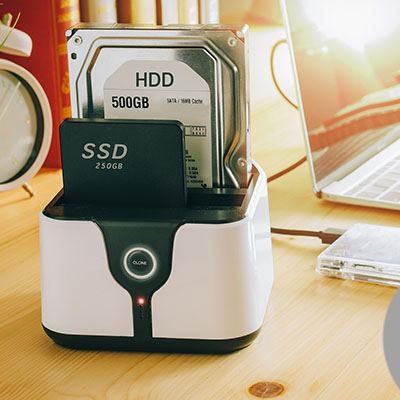
The hard drive is an essential component of every computer. When you start looking at new computers you may notice that there are two different types of hard drives available. There are the HDD (hard disk drive) or the SSD (solid state drive). Today, we’ll go through what the difference is and what benefits you may get from outfitting your hardware with solid state drives.
What is the Difference Between SSD and HDD?
The HDD, which is the type of hard drive that most of us are familiar with, has been used for quite some time. They have rotating metal platters that spin at high rates of speed, and feature mechanisms for reading and writing data on these disks. Every time something is saved to disk, the computer needs to get these wheels spinning.
On the other hand, SSDs have no moving parts whatsoever. They use flash memory to store that information. Since they aren’t dependent on fast-moving physical components, they can write and read data at much higher speeds.
When is an SSD Better than an HDD?
You won’t be too surprised to learn that there are plenty of reasons to choose an SSD over an HDD. Here are four:
- Improved boot times – If you store your operating system on an SSD (and most of us do), it will load faster.
- Quicker application access – Your applications will load much faster if they are stored on an SSD.
- They’re quiet – SSDs make much less noise because they don’t have moving parts on the inside, and they are much more efficient.
- The increased speed is worth the money – SSDs are still much more expensive than your average HDD, but with the increase in speed, you can get more done. The devices tend to pay for themselves pretty quickly.
Is an SSD the Answer for Your Next Computer?
Solid state drives are a great innovation that any user should consider. If you are looking to refresh your business’ computing infrastructure, or you just want a faster computer, the technicians at GeekBox IT can help. Give us a call at (336) 790-1000 today for more information.
